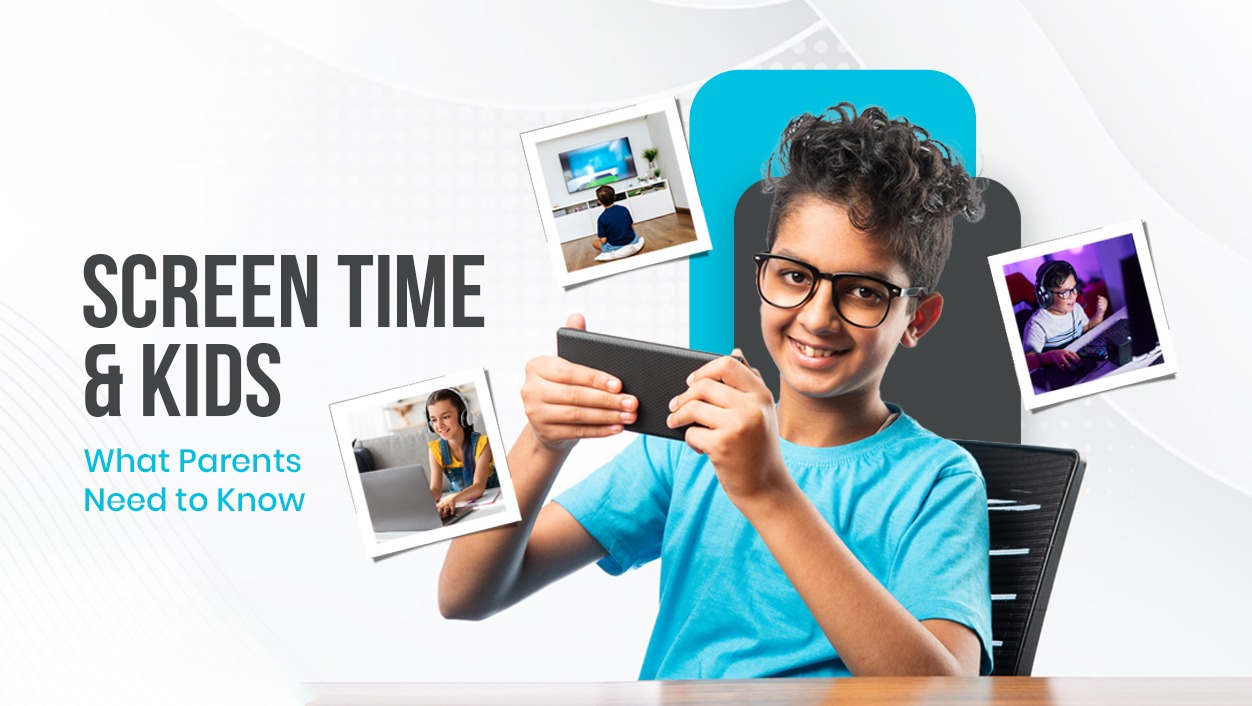Have you ever noticed how quiet a room full of kids can get when each one is glued to a screen?
In restaurants, waiting rooms, even playgrounds…
It’s not unusual to see toddlers swiping through reels before they can even talk properly. Parents often hand over the phone just to buy a moment of peace. And let’s be honest, in today’s fast-paced world, who can blame them?
Screens are everywhere. They entertain, distract, and sometimes even educate. But slowly, they’re replacing something far more valuable: human connection, play, boredom, exploration, and even family time.
Many parents say:
- My child throws tantrums without the iPad.
- She doesn’t eat without a cartoon playing.
- He wakes up and asks for the phone first thing.
This isn’t about blaming anyone. This is about understanding what’s going on and gently taking back control.
How much screen time is okay for kids?
This is the big one. The question every parent wants a straight answer to. And the truth? It depends on the child’s age, what they’re watching, how they’re watching, and what they’re missing out on because of it.
For toddlers under 2, it’s best to keep screens away altogether, except maybe for the occasional video call with a grandparent.
For kids aged 2 to 5, short supervised screen time, maybe 30 minutes to an hour a day, is manageable if balanced with play, conversation, and outdoor time.
As kids grow older, quality and context matter more than the timer. But even then, having screen-free zones and times like meals, car rides, and bedtime helps anchor them back to the real world.
It’s not just about counting minutes. It’s about creating a rhythm that works for your child, your home, and their growth.
What are the effects of too much screen time?
It usually starts small. A cartoon to help them eat, or a mobile game just to keep them busy for a while. But slowly, it becomes a habit. Then, a dependency.
Physical health:
- Kids often complain of tired or burning eyes after long hours of screen use.
- Screen time, especially before sleep, can disturb their sleep routine.
- Less movement can lead to weight gain, and long hours of sitting can affect posture too.
Mental well-being:
- Many kids become more anxious or low in mood when they’re on screens for hours.
- They might struggle to focus on one task or follow through, especially with studies.
- Over time, they may prefer screens over real conversations and play.
Social development:
- For small kids, too much screen time can delay speech and communication.
- Older children may find it harder to connect with people and maintain friendships.
- Some may also show more irritability or angry outbursts when asked to stop screen time.
These things build up over time, and before you know it, the screen has taken over moments that used to be real.
How Do We Actually Limit Screen Time for Kids?
This is one of the most common struggles parents talk about —and yes, it’s totally possible with some consistent changes at home.
Here are a few things that genuinely help:
- Set some clear rules: Like “no screens during meals” or “only 1 hour of screen after homework.” Once it becomes routine, kids adjust faster than you think.
- Make certain areas tech-free: Bedrooms and dining tables are a great place to start.
- Don’t make screen time a habit for eating: If kids are used to watching while eating, gently break that cycle. Sit with them, talk, tell stories.
- Swap it with something better: Have books, craft stuff, or board games ready, anything they like that doesn’t need a screen.
- Let them earn screen time: Maybe after finishing homework or cleaning their room it turns screens into a reward, not a given.
- Be a role model: This one’s tough, but if they see you scrolling all the time, your rules won’t work.
Final Thoughts
We’re not here to fight technology. Screens are part of modern life, and they’re not going away. But childhood is about more than swipes and scrolls. It’s about messy play, silly conversations, imagination, and real connection.
The goal isn’t perfection. It’s balance. Small, consistent changes can slowly shift habits. What matters most is being present, staying involved, and remembering that every moment we spend with our children shapes who they become.
Let’s not hand over that responsibility to a screen. Let’s raise them ourselves with love, patience, and a little more time unplugged.









